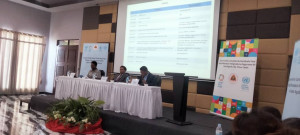Government and partners release the result of the first IPC Acute Food Insecurity classification

The Ministry of Agriculture and Fisheries, through the National Council for Sovereignty, Food Security, and Nutrition in Timor-Leste (CONSSANTIL – Portuguese acronym), with the support of the World Food Program (WFP) and the Food and Agriculture Organization of the United Nations (FAO), held, on February 14th, 2023, the launching ceremony of the IPC Acute Food Insecurity classification. The event took place in the City 8 Conference Room in Dili.
IPC’s Acute Food Insecurity classification is a tool that aims to improve food security analysis and decision-making, with a focus on short-term objectives to prevent, mitigate, or reduce severe food insecurity. The study distinguishes the level of food insecurity into five distinct phases: 1 – minimal or no acute food insecurity; 2 – food stress; 3 – food crisis; 4 – food emergency; and 5 – catastrophe or famine.
The analysis results indicate that currently, 300 thousand people in Timor-Leste face high food insecurity (IPC Phase 3 and 4) and 262 thousand people are projected to face increased food insecurity during the next period, from May to September 2023.
Eleven of the fourteen municipalities are classified as phase 3 (crisis), and three are classified as phase 2 (stress).
The main factors for reduced household capacity to access and purchase food are the pandemic, the effects of the war between Russia and Ukraine, global food and fuel price increase and the floods of 2020 and 2021.
The Minister of Agriculture and Fisheries and President of CONSSANTIL, Pedro dos Reis, argued that “a strong cooperation in sectors related to agriculture and climate is crucial for food security, one of the main problems faced by our country”.
The minister also stated that with “the use of this multisectoral and global tool for food security analysis, we can complement pre-existing efforts to identify the most vulnerable populations and provide recommendations for better decision-making on policy formulation based on real data”.
Cecilia Garzon, WFP’s representative in Timor-Leste, expressed positive appreciation “for the Government’s efforts in taking the lead to make this analysis a reality” and assured of WFP’s readiness, with its “systems and experience” to “support the Government with the most appropriate means to reach the neediest people”.
While reactivating the chronic analysis Technical Working Group carried out in 2018, the Government, with WFP support, convened a two-week IPC training and analysis workshop to conduct the first acute IPC analysis in Timor-Leste. The technical working group has 45 members drawn from the Ministry of Agriculture and Fisheries, CONSSANTIL, the General Directorate of Statistics, WFP, FAO, international and local NGOs, and Directors of Food Security in each municipality. By consolidating broad data sources, including income, drought, inflation, Government social protection, food production, etc., the working group reached a consensus on all results to be published.
The event was also attended by the Coordinating Minister of Economic Affairs, Joaquim Amaral.










































